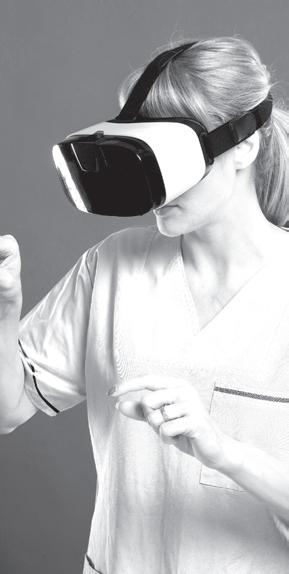
6 minute read
IS SIMULATING DISABILITY ABLEIST?
AbleOTUK members explore the topic of simulating disability as part of occupational therapy education and discuss the ableist connotations it can present
Arecent video post on social media showed occupational therapy students participating in simulated learning to convey the experience of using a prosthetic limb. This generated a discussion amongst AbleOTUK members about the ethics and morals of simulated learning, leaving us with uncomfortable questions: is our simulation practice ableist, and do we need to change? Do we need to use all types of simulation in preregistration or should some types be stopped? To what degree is it possible to simulate disability? Which types of simulation are effective in supporting learners to achieve learning outcomes? To answer these questions we spoke to Caroline Coster who delivered the lived experience portion of the session and reached out to occupational therapists and students with lived experiences of disability.
Advertisement
Pre-registration occupational therapy courses engage in simulation (as outlined in preregistration education standards) but how simulation is delivered is not yet regulated in the UK. There is a spectrum of practice within education ranging from case studies on paper, and role play, to high-tech immersive reality to simulate disabilities.
This is not a new debate in the profession. Simulated experiences of disability, for example, using visual impairment goggles, wheelchairs and hoists, being fed, dementia and autism simulations, even wearing body suits which simulate obesity have been used and critiqued within healthcare and occupational therapy education and continuing professional development before.
What are the experiences and views of simulated disability within occupational therapy today?
WHAT ARE THE EXPERIENCES AND VIEWS OF SIMULATED DISABILITY WITHIN OCCUPATIONAL THERAPY TODAY?
CAROLINE COSTER’S VIEW

Regarding the social media video: “This was a small part of an amputee workshop, which also included speaking to Caroline Coster (quadruple amputee and blogger) about her lived experiences. They also spoke to occupational therapists and physiotherapists working in this specialist area before trialing the early walking aids to deepen their appreciation.”
Caroline had previously supported students in sharing her lived experience of being a quadruple amputee alongside setting some problem-solving activities. Despite not having been directly involved in planning the full session she felt comfortable with the use of simulation as a valuable learning experience alongside the lived experience discussion. Caroline felt the students were sensitive and insightful in their questioning and she was upset that this had been viewed in a negative light, which demonstrates how nuanced this topic may be. She also wasn’t offended by the music and noted that the students looked focused in the video.
Caroline recognised that universities may find it difficult to find someone with lived experience who has the time or energy to give and we also discussed the issue of appropriate remuneration. Caroline is keen to continue to support occupational therapy education and also provides support for other quad amputees. She can be contacted via Twitter @CCquad or Facebook @JourneyOfRecoveryCC
Them And Us
Disabled OTs spoke about how they felt being in the room when disability simulations were happening - particularly where there was no lived experience represented. They discussed how the language used was sometimes ‘othering’ and may have served to perpetuate a divide between non-disabled occupational therapists and the disabled populations. Shelton (2019) describes a potential discomfort for disabled people engaging in simulations intended to replicate their experience.
Laura Casey remarked that “Booksmart stuff is great, but reality is different”, and Jordan Gooding spoke about the importance of empowering occupational therapists with their own lived experience of disability within the profession, requiring us to support disabled OTs to feel welcomed and belonged, which sadly isn’t always happening currently.
Disability Is Not Entertainment
Many of us reflected on our experiences of “trying out” a wheelchair, or simulating sensory impairment with some finding it a formative learning experience that they carried with them their whole careers, and others finding it “fun”. Fun activities within pre-registration do contribute to student satisfaction (something universities are very keen on due to NSS scores). However, fun is not the point of the educational experience of simulation. Disability and ableism is not fun. Ableism is not fair or fun. Byrne-Haber (2020) outlines five reasons that the experience of disability can not be simulated completely.
Hattie - a self-proclaimed autistic, mad OT - highlighted that: “Disability isn’t a funfair attraction and the best way to learn is to meaningfully engage with disabled people.” Do simulations “offensively exaggerate” someone’s lived experience and could they even diminish our willingness? As Hattie says, it is vital to be “open, curious and empathetic toward the experiences of people we work with, especially where those experiences are different to our own, recognising everyone as the expert in with lived experience from design to implementation, and to reflection.
Sorcha Dunne wonders if “trying on” of disability is “performative allyship” and asks us to “listen to and engage with disability activists.” This is further supported by VanPuymbrouck et al. (2017). Twitter, and more recently TikTok, are full of disability activists creating content and responding to and engaging with sensitively addressed comments and questions from their audience.
DOES DISABILITY SIMULATION CHANGE ATTITUDES?
The effectiveness of disability simulation on changing attitudes will depend on how it is delivered in classrooms, and why.
One study compared occupational therapy students completing an accessibility audit versus using a wheelchair. “The results of this study demonstrate that disability simulation is no better than an accessibility audit in improving attitudes toward people with disabilities. Therefore, educators should cease use of these activities.” (Pebdani and Bourgeois, 2019).
A meta-analysis (Ma and Mak, 2022) their lives and experiences.”
Leo and Godwin (2016) explored how individuals with a disability felt about simulated experience and their responses were summed up in three themes:
Disability mentors required
Life is not a simulation
Why are they laughing
All of these themes demonstrate the importance of including people of mobility simulation programmes demonstrated mixed impacts, including the consideration of the potential emotional impact on participants. Which poses questions about the duration, type of simulation, and the debriefing offered.
Feldner et al. (2022) stated: “... simulations have increasingly been critiqued for distorting the reality of living with disability, reproducing stereotypes that disability is related to incompetence and dependency of the person, and failing to contextualize the lived experience of disability from the perspective of people with disabilities themselves… studies outside rehabilitation have shown that disability simulation produces more negative attitudes toward disability…further research is warranted to more deeply examine changes in both explicit and implicit attitudes using strategies other than simulation.”

Pattern (2016 p8) argued: “What if we show (in simulation) how difficult it is for an expert wheelchair user to navigate an appointment or work due to unreliable transportation options? What if we listen as wheelchair users explain what they deal with and the bias they face? We understand physical inaccessibility, but do we see the systemic bias that makes an environment difficult to navigate due to stigma, discrimination, low expectations, and policies that deny inclusion and full participation?”
Dr Michelle Nario-Redmond (2019) supported both Laura Casey and Jordan Gooding in stating that we seek to recognise what other factors may be important to the person with lived experience such as economic factors, upbringing, and intersectional identities.
Sorcha Dunne also asks us to question the view that it is important for non-disabled OTs to experience the situation themselves and whether this “furthers the issue that disabled narratives are less valued than others.”
AbleOTUK position statement on the use of simulating disability within preregistration education and continuing professional development
As the UK occupational therapy affinity group for therapists with disabilities and long-term conditions within the profession, we recommend:
Significant professional reflection and debate on whether the current practice of simulating disability (in the context of preregistration, in all its forms) is ableist. Reflection requires insight into ableism and anti-ableist educational practices, with the consideration of intersectional identities. Staff and students may benefit from mandatory “what is ableism” sessions prior to engaging in simulation.
Further practical and research exploration of the question: What does effective anti-ableist simulation in pre-registration education look like?
That RCOT considers adopting the CAOT joint statement on inclusive education for persons with disabilities until the UK creates their own statement. In order to value the role of lived experience from within the profession, seeking to make occupational therapy education and the profession antiableist.
Working with people with lived experience and disability advocacy organisations to co-design education (including but not limited to simulated experiences) in appropriate, antiableist, sensitive ways (and with appropriate remuneration to them).
Our initial response to the video reflects the complexity that this topic raises. On further exploration, it appears that the simulation in question was part of a wider piece of learning which most importantly included the voices of lived experience.
“Those of us with lived experience of disability question what we learn from simulation of disability. We acknowledge that people learn through experience and experiencing what it might be like is valuable. However, we must ensure that as a profession we reflect on how this practice might be seen as ableist by those with lived experiences. There are lots of experiences that simulation cannot demonstrate, for example: fatigue, living in pain, often having to justify yourself, often not being believed. It’s really important that we ensure that students learn from those with lived experiences.”
Caroline also reminds us: “If you have met one person with a quadruple amputation you have met one person with a quadruple amputation.”
We must listen, uplift and respond to the lived experiences of every single person we work with regardless of our own experiences of disabilitysimulated or lived.






